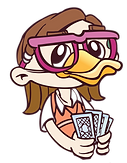
If a goose has friends they are all called “geese”
The word “goose” comes into English from an ancient Germanic language that had something called strong declension.
Basically, what it means is that these words, which include “foot” and “tooth,” pluralize by changing the “oo” to “ee” (like foot/feet and tooth/teeth).
So that’s why the plural of “goose” is “geese.” Similar rules come into play for the words “louse” and “mouse.”
While people may have used a word similar to “hide” as the plural form of “house,” the word was simply modernized into the more standard form of English pluralization
(addition of the letter -s) while the others were not.
“Moose” comes into English from a North American/Native American source around
400 years ago and does not follow the ancient Germanic language rules.
The similarities between the two words is simply coincidental.
See for yourself: Find weird plural nouns!
In English, most nouns simply add an “s” or “es” to the end of the noun to make it plural.
But some, like the words mentioned above – geese, feet, mice and others –
have a different word completely to mean more than one.
Search the internet for “irregular plural nouns” and explore the different forms of these!


